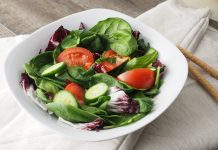
Your daughter’s weight is appropriate for her height if she is still 5″3″ and 110 pounds. However, you do not know if she weighs 110 and it may be confrontational (power struggle) to get her on a scale. The eyeball test also works. If a person looks thin, they probably are underweight.
In order to prevent fatty acid deficiency, you only need about 1 tsp. of polyunsaturated oil per day. Even diets that are extremely low in fat, can’t get that low even if the person only eats fruits, vegetables or fat-free grains. But, your daughter may not be getting the fat she needs. You can talk to her that a fat-free diet is unhealthy for her skin as it will become dry, red and flaky. Appeal to her concern for her health as she may be eating a low-fat diet because of the health benefits.
Just lowering the fat content in your diet does not necessarily lower your body weight. Researchers have found that people will make up the difference in calories of lower fat foods by eating more food later in the day. Unless of course, the person is restricting their food intake which will result in lowering body weight.
Your body needs fat to make sex hormones and if your daughter’s body fat is less than 18% she may not be menstruating. This is another indicator of low body weight as well. The long-term consequences of not menstruating and low body weight shows up most in a woman’s bones. Bones lay down calcium until they reach a maximum density around 25 years of age. After 25, you can maintain your bone density by eating calcium-rich foods and weight-bearing exercise (anything except swimming and bicycling). If a person restricts their intake of calcium-rich foods like dairy products, they risk early osteoporosis. Perhaps your daughter would be more motivated to modify her low-fat eating habits if she knew the consequences on her bone health rather than focusing on her weight unless she is less than 95 pounds. If she is less than 95 pounds, read the anorexia topic.


